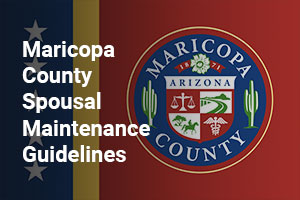Maricopa County Spousal Maintenance Guidelines
 Spousal maintenance, also known as alimony or spousal support, is something that many divorcing spouses ask about. Will one spouse be awarded alimony if they seek it? How much? And for how long?
Spousal maintenance, also known as alimony or spousal support, is something that many divorcing spouses ask about. Will one spouse be awarded alimony if they seek it? How much? And for how long?
In Arizona, there are no hard-and-fast rules or formulas for determining spousal maintenance. This matter is up to the judge’s discretion. However, judges are directed by a number of guidelines prescribed by Arizona Revised Statutes Section 25-319. These guidelines help determine two things: first, whether one spouse is entitled to alimony, and second, the amount and duration of the alimony they will receive.
Will One Spouse Receive Spousal Maintenance?
Not all divorces involve the awarding of alimony. According to Arizona law, either spouse in a divorce may be granted spousal support. But only if any of these five conditions is true:
- The spouse lacks sufficient property to provide for their reasonable needs.
- The spouse is unable to be self-sufficient through employment, OR they are a custodian of a child whose age or condition prevents the spouse from working outside the home, OR the spouse lacks the earning ability to be self-sufficient.
- The spouse has made a significant contribution to the education, career, or earning ability of the other spouse.
- It has been a lengthy marriage and the spouse is now at an age where employment is precluded.
- The spouse significantly reduced their own income or career opportunities for the benefit of the other spouse.
How Much Will The Alimony Be? How Long Will It Last?
The amount and duration of the spousal maintenance will also be decided by the judge. Again, there is no formula or step-by-step computation. Arizona law only recommends that these 13 factors be considered in the judge’s decision:
- The standard of living established during the marriage.
- The duration of the marriage.
- The age, employment history, earning ability and physical and emotional condition of the spouse seeking maintenance.
- The ability of the spouse from whom maintenance is sought to meet that spouse’s needs while meeting those of the spouse seeking maintenance.
- The comparative financial resources of the spouses, including their comparative earning abilities in the labor market.
- The contribution of the spouse seeking maintenance to the earning ability of the other spouse.
- The extent to which the spouse seeking maintenance has reduced that spouse’s income or career opportunities for the benefit of the other spouse.
- The ability of both parties after the dissolution to contribute to the future educational costs of their mutual children.
- The financial resources of the party seeking maintenance, including marital property apportioned to that spouse, and that spouse’s ability to meet that spouse’s own needs independently.
- The time necessary to acquire sufficient education or training to enable the party seeking maintenance to find appropriate employment and whether such education or training is readily available.
- Excessive or abnormal expenditures, destruction, concealment or fraudulent disposition of community, joint tenancy and other property held in common.
- The cost for the spouse who is seeking maintenance to obtain health insurance and the reduction in the cost of health insurance for the spouse from whom maintenance is sought if the spouse from whom maintenance is sought is able to convert family health insurance to employee health insurance after the marriage is dissolved.
- All actual damages and judgments from conduct that resulted in criminal conviction of either spouse in which the other spouse or a child was the victim.
Because these guidelines are not specific rules, courts across Arizona make widely varying spousal support decisions. This also means that if you are a spouse seeking maintenance, you may be able convince the judge to grant you a favorable alimony amount and duration if you build a strong case. Having the guidance of a divorce attorney can be extremely valuable in this regard.
In Maricopa County and nearby areas, talk to our attorneys at Goldman Law. We are highly experienced in helping clients get their ideal spousal support award. Call us today at (602) 698-5520.


